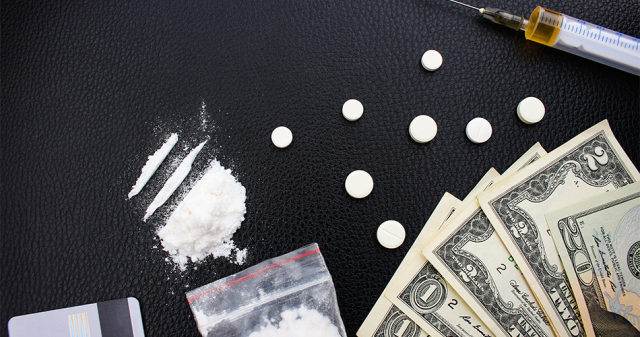
U.S. Reps. Bonnie Watson Coleman (D-NJ) and Cori Bush (D-MO) recently announced the reintroduction of the Drug Policy Reform Act. This is on the 52nd anniversary of former President Richard Nixon (R) declaring the deadly war on drugs and expanding law enforcement to a point that not only militarized police forces in the United States but continued to perpetuate systematic racism.
The two members of Congress initially proposed a variation of the bill in 2021 in an attempt to federally decriminalize all illicit drugs and mass expungement of criminal offenses. Such a bill would be a strong change in support of harm reduction rather than putting forth oppressive law enforcement policies and prison sentences.
#OTD 52 y.o. Nixon declared the "war on drugs."
It was never about health or safety but about suppressing the voices and lives of the marginalized.@RepCori and I will be reintroducing the Drug Policy Reform Act to end the W.O.D. and treat people with a health centered approach https://t.co/S31o18P8TV— Rep. Bonnie Watson Coleman (@RepBonnie) June 17, 2023
#OTD 52 years ago, President Nixon started a violent campaign against Black and brown communities known as the War on Drugs.@RepBonnie & I are proud to soon reintroduce the Drug Policy Reform Act to decriminalize drug possession, expunge records, & finally end the War on Drugs.
— Congresswoman Cori Bush (@RepCori) June 17, 2023
“52 years ago, President Richard Nixon initiated a violent, racist campaign against Black and brown communities in this country,” Coleman and Bush said in a press statement. “From the start, the War on Drugs has been about suppressing the voices and lives of the marginalized, not about health or safety. Unfortunately, our society continues to perpetuate the discredited War on Drugs.”
What would happen?
The Drug Policy Reform Act would end threats of incarceration for individuals caught possessing illicit drugs and substances for use. If it were to become law, the court would still have the option to impose fines or fines could be waived for people who couldn’t try and pay fines. Additionally, in another change, the classifying of drugs and the responsibility would be transferred from the Drug Enforcement Administration and the Department of Justice to the Department of Health and Human Services with the intent being to shift these roles to a much more “health-centric model” for a regulatory approach. Under the Drug Policy Reform Act, federal district courts would be required to facilitate the implementation of expungement which would result in record sealing for those who have individuals who have qualified convictions within one year of the bill’s enactment and effectivity. If passed and signed into law by President Joe Biden, this law could be game-changing.
“We will continue to advocate for this vital legislation in Congress, and we urge the Biden Administration to take every possible step within its power towards a public health approach to drug policy,” Reps. Coleman and Bush said in the press release already in this same column. “We must transform federal drug policy in our country, protect Black and brown communities, and save lives.”
According to raw data published by the Federal Bureau of Prisons, about 44.4 percent of federal offenses are due to drug crimes.
| Drug Offenses | 65,945 | 44.4% |
This is also noteworthy because the legislation’s decriminalization provisions would be helpful in countering and reducing drug crime convictions. The Congressional Progressive Caucus endorsing the 2021 variation of the Drug Policy Reform Act cites data that there are 1.35 million arrests per year. Every 25 seconds, a person is arrested for possessing drugs for purely personal use. And, this results in people of color being arrested and over-policed. This over-policing has resulted in millions of people serving prison time for months, even several years, due to statutory mandatory sentencing minimums for crimes that are only simple drug possessions. And, with the war on drugs set up in a way to systematically oppress communities of color, reform is necessary.
The benefits of drug decriminalization

The federal government has literally spent hundreds of billions of dollars on failures in transnational drug enforcement. Coleman and Bush are now working to benefit drug decriminalization.
Drug decriminalization is a policy approach that shifts the focus from criminalizing drug possession and using it as a public health and social issue. Firstly, decriminalization prioritizes public health over punishment. It recognizes that substance use disorders are primarily health issues rather than criminal offenses. By treating drug use as a public health concern, resources can be redirected toward prevention, harm reduction, treatment, and more support services. This approach acknowledges that individuals struggling with drug addiction need support, rehabilitation, and access to broad healthcare rather than punishment and imprisonment.
Decriminalization aims to reduce the harms associated with drug use. When drugs are decriminalized, individuals who use drugs are less likely to face criminal charges, which can lead to a range of negative consequences such as a criminal record, barriers to employment rights, housing, and education, and stigmatization.
By avoiding these punitive measures, individuals are more likely to seek help, access treatment services, and engage in harm reduction practices. This can contribute to a decrease in drug-related health issues, overdose deaths, and the spread of blood-borne diseases. Drug decriminalization can help alleviate the burden on the criminal justice system. By reducing the number of drug-related cases entering the criminal justice system, resources can be reallocated to address more serious crimes. This can help improve the efficiency of the justice system and also allow law enforcement to focus on more pressing public safety concerns.
Benefits of evidence-based policy

The effectiveness of decriminalization can vary based on specific context and implementation within particular jurisdictions. These different factors, such as the availability of rehab and treatment services, public education campaigns from the governments, and harm reduction initiatives can influence the outcomes of overall decriminalization efforts. Ongoing evaluation is necessary because evidence-based approaches need to be justified in support of a drug reform policy that benefits all individuals, especially the folks in communities of color. This approach would include collaboration with policymakers, medical and public health professionals, and community stakeholders essential to seeing the fully successful adoption of drug decriminalization policies. Anyone who is in favor of tobacco harm reduction should support the Drug Policy Reform Act and general efforts to decriminalize drug possession in the United States. Why? Because, as we’ve seen in the tobacco control movements, harm reduction has been excused as a viable intervention to support healthcare improvements in smokers.
Decriminalization is a harm reduction. Vaping, tobacco harm reduction, and drug legalization and decriminalization are interconnected issues that can be approached from a harm reduction perspective. While vaping legalization primarily pertains to the regulation and control of electronic cigarettes and related products, drug decriminalization refers to the removal of criminal penalties for the possession and use of certain recreational drugs.







